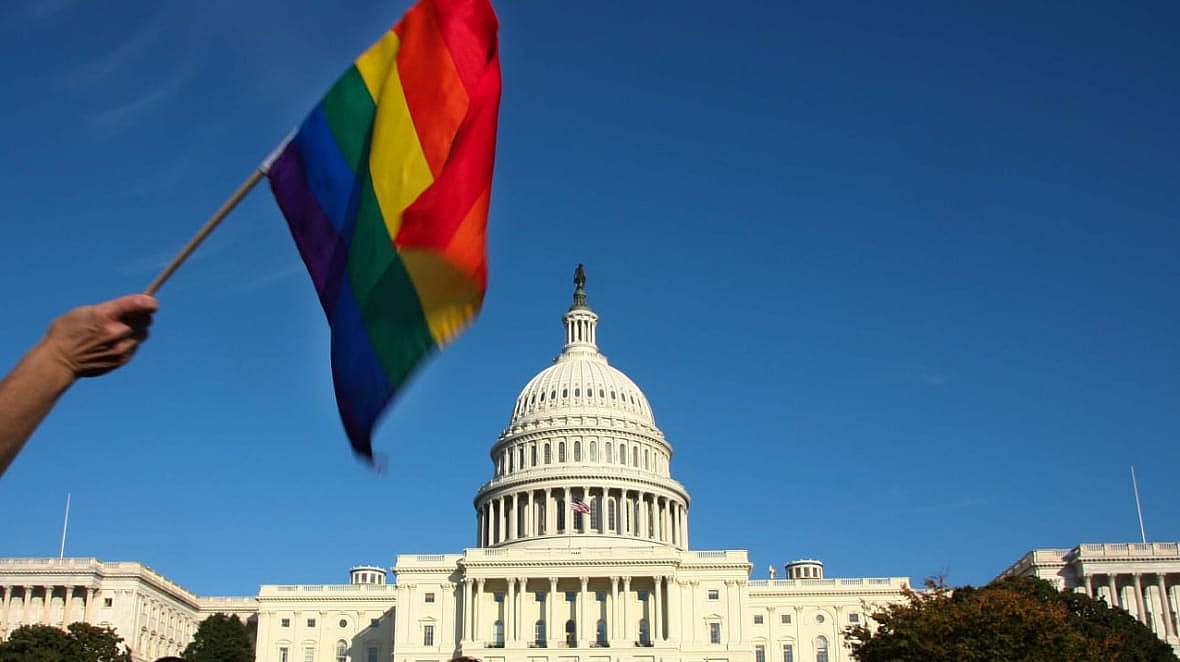The United States Senate on Tuesday night passed the landmark Respect for Marriage Act, which will codify same-sex and interracial marriages. Twelve Republican senators voted with Democratic senators, 61-36, to send the legislation back to the U.S. House of Representatives for a vote and thereafter President Joe Biden’s desk to sign into law.

The bipartisan vote is a rare occurrence on Capitol Hill, where Democrats and Republicans hardly ever agree or work together. U.S. Rep. Mondaire Jones, D-N.Y., the nation’s first openly gay Black member of Congress, says it shows how far the nation has come in the fight for LGBTQ rights.
“If you had told me 10 years ago, that there would be [at least]10 Republican senators, joining 50 Democratic senators to overcome the filibuster and to codify the ability of millions of LGBTQ+ Americans to have their marriage recognized by the federal government, I would have been skeptical,” Jones told theGrio.
The congressman, who voted for RFMA in the U.S. House of Representatives in July, says, “we have won this issue,” adding that “even in red states, majorities of people believe that folks ought to be allowed to marry whom they love … I continue to be amazed by the shift in public opinion on this over such a short period of time.”
Jones said it’s also important to “recognize that marriage equality is something that impacts queer communities of color, including the Black LGBTQ+ community,” adding, “this legislation is a victory, for that reason, for the Black community, which is a beautifully diverse community.”
The move by some Senate Republicans to work with Democrats comes amid political worry that marriage equality could be overturned after the United States Supreme Court struck down the constitutional right to an abortion this past summer. In his concurring opinion in the case, Dobbs v. Jackson, Justice Clarence Thomas wrote that previous rulings granting federal protections for same-sex marriage and intimacy under the Fourteenth Amendment should also be reconsidered.
Thomas’ judicial forewarning was enough to jolt the bipartisan effort to protect the right to marry for millions of same-gender couples through the Respect for Marriage Act. While Thomas did not indicate in his Dobbs opinion an interest in undoing the legality of U.S. interracial marriages, of which he is a part of himself, the bill would also enshrine protections for marriage based on race.

What does the Respect for Marriage Act do?
The Respect for Marriage Act would, for the first time, provide statutory authority for same-sex and interracial marriages and allows the federal government to bring a civil lawsuit against anyone who violates the statutory rights of gay, lesbian or interracial couples.
The bill also notably repeals the 1996 federal law, the Defense of Marriage Act (DOMA), which once defined marriage as between a man and a woman. The bill was signed into law by Democratic President Bill Clinton, who was faced with political pressure from a Republican-controlled Congress to side with a socially conservative movement to protect the “institution” of what was seen as a traditional marriage at the time. “The Defense of Marriage Act should never have been signed into law. And I’m glad that that statute has been relegated to the dustbin of history,” Jones tells theGrio.
While DOMA was eventually ruled unconstitutional by the Supreme Court in 2013, there isn’t an official law in the books granting lesbian and gay couples the right to marry.
However, statutory authority doesn’t exactly make same-sex marriage the law of the land, notes Rep. Jones, who said despite the great achievement of the Respect for Marriage Act, “it does not go far enough.”

“This legislation says the federal government must recognize a marriage that was legally performed within a state. It does not require all states to allow marriage equality,” explains Jones.
Therefore, if the conservative-majority Supreme Court votes to overturn marriage equality, as Justice Thomas has indicated he would do, the federal government — much like in the case of abortion after the court overturned Roe v. Wade — would be powerless to stop states from repealing marital rights for gay and lesbian couples.
“It means you can go to Mississippi and be denied the ability to get married to your partner, and the federal government will not vindicate your right to require Mississippi to perform that marriage if the Supreme Court overrules its precedent in [the] Obergefell [case],” said Jones.
Jones says Congress would need to legislatively take “another step” to make marriage equality a federal right for all, something he doesn’t anticipate happening in the new incoming 118th Congress, where a Republican majority will control the House. But as of now, the Supreme Court’s 2015 ruling in Obergefell v. Hodges, which ruled that same-sex couples have a fundamental federal right to marry in all 50 states, the District of Columbia, and insular areas, remains the law of the land.
Pennsylvania State Rep. Malcolm Kenyatta, who is the state’s first openly gay lawmaker of color and a former U.S. Senate candidate, said RFMA is a “first step” and admits that it’s clear from the language of the bill that it is of compromise for Democrats. However, he says Republicans who voted against the bill were, essentially, “spitting in [the] face” of LGBTQ Americans and their families. “We’re still in a position where basic fundamental human rights are still up for such pitch debate,” he says.

The new legislation also includes an amendment added by Republicans that would protect faith-based organizations from being compelled to honor same-sex marriage based on religious freedom rights under the First Amendment. Jones says existing law already provides such legal protection. “Many of the provisions in the Senate version of the Respect for Marriage Act concerning religious liberty seem like a restatement of existing law,” he says.
“It is already the case, as I understand it, that you cannot require a house of worship to solemnize or celebrate a marriage between two individuals of the same sex.”
Kenyatta says the political environment in some states is ripe for repealing same-sex marriage if the Supreme Court overturns Obergefell, pointing to South Carolina as a prime example. The state’s governor, Henry McMaster, said during a gubernatorial debate this year that he would ban gay and lesbian couples from getting married if the high court were to ever rule against marriage equality.
“We’re gonna have to come back and try to do what we need to do right now … which is to codify those protections,” says Kenyatta, who chairs the pro-LGBTQ Agenda PAC. “I think even the authors of the [Respect for Marriage Act] would suggest that we have to keep moving forward, but it is frustrating that you have to beg and plead and push and scrap and claw to even get this.”

Bipartisanship aside, Congressman Jones notes an irony that some Republicans voted to protect marriage equality based on a worry that the very conservative justices they voted to the Supreme Court could overturn a current fundamental right that 61% of Americans support, as well as 68% of Black voters survyed by theGrio/KFF this past summer.
“Republicans will try to undo some of the damage that they themselves have created. In this case, by, you know, stealing seats on the Supreme Court and installing far-right justices, who are even outside of mainstream Republican views,” says Jones.
“It also vindicates the resources that Democrats put into holding the Senate because Republicans should not be allowed to appoint anyone else in the mold of Sam Alito or Amy Coney Barrett or Clarence Thomas if we want to have our basic rights and civil liberties protected in the 21st century.”
TheGrio is FREE on your TV via Apple TV, Amazon Fire, Roku and Android TV. Also, please download theGrio mobile apps today!

